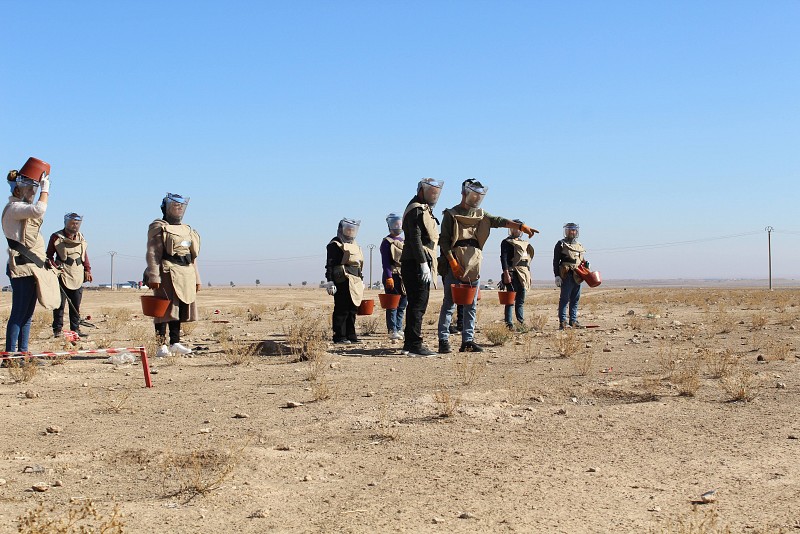New Phase of “Clear then Grow” Begins in Northeast Syria with Support from France

ITF has launched a new phase in the long-term effort to localize and strengthen the humanitarian mine action response in Northeast Syria (Clear then Grow – Phase IV). Supported by the French Republic, this initiative continues ITF’s holistic approach to humanitarian mine action, supporting communities in regaining safe access to land, essential services, and livelihood opportunities after years of conflict.
Why This Project Matters
More than a decade of conflict has left Syria heavily contaminated with unexploded ordnance, improvised explosive devices, and explosive remnants of war. These hazards endanger civilians in their homes, on agricultural land, and along routes needed to access water, healthcare, schools, and markets. Large areas of productive land remain unusable, directly undermining food security and early recovery.
In this context, mine action is a life-saving priority. Surveying, clearing, and educating communities about explosive hazards prevents accidents, restores safe access to vital resources, and enables families to resume productive activities safely and with greater confidence.
Building on Clear then Grow’s Proven Impact
Phase IV builds on the achievements of earlier cycles of Clear then Grow implemented since 2020. With prior support from the Slovenian Ministry of Foreign and European Affairs (Slovenia Aid & Partnerships) and the French Ministry for Europe and Foreign Affairs, ITF and its local partner Reachout implemented a comprehensive, community-centred response that combined explosive ordnance risk education (EORE), non-technical survey (NTS), clearance, and follow-on recovery support in Northeast of Syria.
Through a strategic partnership, ITF has also been supporting Reachout’s progress toward organizational and technical capacities for sustainable humanitarian mine action in Syria. This model helped return land to productive use, improved safety for displaced families and host communities, and strengthened local resilience. The new phase, which began on 1 November 2025, maintains the same comprehensive approach while expanding operations into newly accessible areas and high priority areas identified through recent assessments, with the aim of restoring safe access to agricultural fields, roads and public infrastructure critical to local recovery.
Localization as a Continued Priority
This stage deepens earlier commitments to locally led action. The initiative continues to invest in local capacities, maintaining localization and national ownership as central priorities. ITF is strengthening its cooperation with Reachout to enhance organizational systems, safety management, and technical expertise across EORE, non-technical and technical survey, clearance, and quality management. Initial training activities commenced in early November 2025, with Reachout taking the lead in guiding instruction for NTS, EORE, and clearance teams, and ITF providing guidance and oversight.
By reinforcing Reachout’s long-term operational independence, this phase ensures a sustainable, locally anchored humanitarian mine action response that can effectively protect communities and support safe access to land and infrastructure in Northeast Syria.
Shared Responsibility and Donor Cooperation
These long-term initiatives reflect growing burden-sharing among donors. While earlier stages of ITF’s efforts in Northeast Syria were supported by the Austrian Development Agency, the French Ministry for Europe and Foreign Affairs, iMMAP France – 3iSolutions, the Knights of Columbus and Slovenian Ministry of Foreign and European Affairs through Slovenia Aid & Partnerships, Phase IV continues this cooperation with France’s renewed contribution, which is complementary to Slovenia’s existing support. Such a shared commitment demonstrates the importance of joined efforts of the international community to sustain life-saving humanitarian mine action operations and to scale impact across the region.
By restoring safe access to land and essential services, ITF-Reachout interventions will help host communities, internally displaced persons, and returnees rebuild livelihoods, reduce tensions, and improve living conditions.